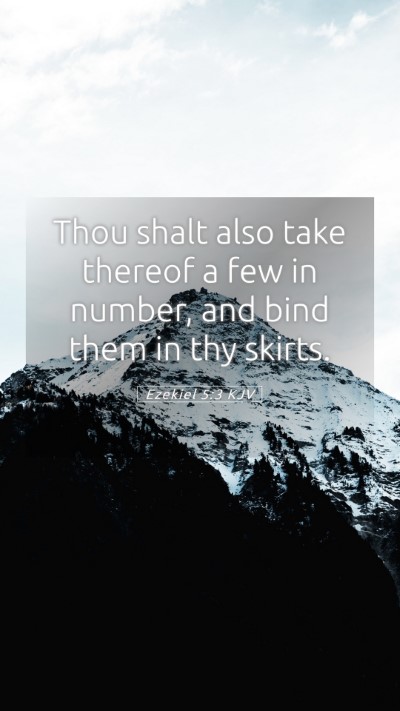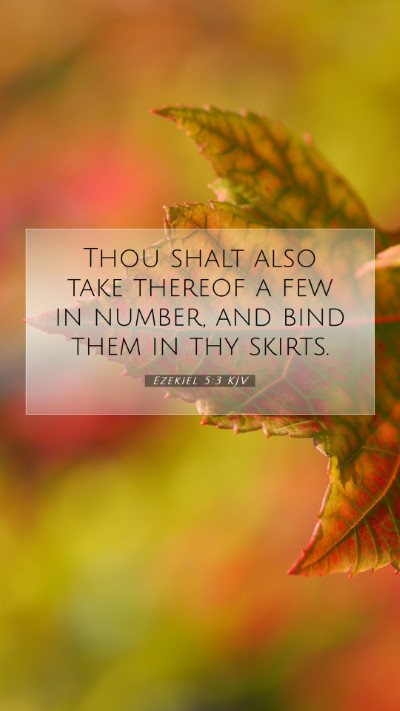Ezekiel 5:3 - Bible Verse Interpretation and Commentary
Ezekiel 5:3 states, “Take also of the few number of hairs, and bind them in thy skirts.” This verse is a part of a prophetic act performed by the prophet Ezekiel, symbolizing the preservation of a remnant of Israel amidst impending judgment. Below is a comprehensive exploration of its meaning, incorporating insights from public domain commentaries such as those by Matthew Henry, Albert Barnes, and Adam Clarke.
Contextual Overview
The book of Ezekiel is filled with symbolic actions and prophetic messages directed towards the Israelites, mainly focusing on their disobedience and impending destruction. Ezekiel, primarily known for his vivid imagery and prophetic actions, uses real-life scenarios to convey powerful messages from God. This particular verse shows a method of communication where God’s intent to preserve a remnant is vividly portrayed.
Interpretation of Ezekiel 5:3
- Symbolism of Hair: The hair represents the people of Israel. The act of taking a few hairs signifies God's intention to save a small remnant from the judgment that was coming upon Jerusalem.
- Binds in Skirts: The reference to binding these hairs in skirts illustrates the concept of holding on to and protecting the remnant God wishes to preserve. It demonstrates the hope and mercy amidst judgment.
- Judgment and Preservation: This verse balances the theme of judgment with the theme of God's mercy. Although judgment was imminent, God aims to maintain a foundation for the future restoration of His people.
Commentary Insights
Matthew Henry: Henry emphasizes the mercy of God in this verse, interpreting the act of binding the hairs as a sign that while the majority would face judgment, a remnant would be shielded and preserved for future purposes. Henry notes that this reflects God's nature of discipline tempered with mercy.
Albert Barnes: Barnes points out that this act symbolizes more than just preservation; it serves as assurance to those who remain faithful that God has not abandoned His covenant people. The few hairs represent those who will be saved and the potential return that God allows for the Israelite nation.
Adam Clarke: Clarke delves into the cultural implications of hair in biblical times, indicating that hair was a sign of strength and vitality. Thus, this action signifies that even amidst destruction, a remnant would be preserved, allowing for life to emerge once again.
Applications and Lessons
Ezekiel 5:3 teaches about the importance of hope and God’s faithfulness. It reminds readers that even during judgment or difficult times, God preserves His faithful people. Believers can derive several lessons:
- God’s Mercy: Reflect on the compassionate nature of God. Even when faced with consequences, He makes provisions for those who remain steadfast.
- Importance of a Remnant: Understand the significance of a faithful remnant in God’s plan for restoration. Such remnants play a crucial role in the continuation of faith and community.
- Call to Faithfulness: This passage serves as a reminder to faith communities and individual believers about the importance of active faithfulness amidst trials.
Related Bible Verses
- Isaiah 10:20-22: Discusses the remnant of Israel who will return and rely on the Lord.
- Romans 11:5: Refers to a remnant chosen by grace in the context of God's people.
- Revelation 12:17: Talks about the remnant of her seed, representing those who keep God's commandments.
Conclusion
Ezekiel 5:3 serves as a reminder of both judgment and grace. The balance between these themes is essential for understanding Scripture and the nature of God. Through the lens of this verse, readers gain profound insights into Bible verse meanings, applications, and interpretations, enriching their own studies and discussions in Bible study groups or individual reflections.


